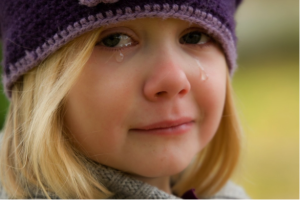Grieving the Loss of a Pet
Grieving the Loss of a Pet
Most of us are familiar with the catchphrase, “Good grief, Charlie Brown!” The words evoke the comical image of the beloved Peanuts characters, created by Charles Schulz. But can the feeling of grief ever be good? At one time or another, we have probably all said the phrase “Good grief!” when we were surprised or alarmed by something we saw or heard, whether good or bad. With that being said, though, I think most of us would agree that grief is certainly not good. Think of just a few synonyms for the word grief, including agony, anguish, pain, despair, and heartbreak. All of these terms are sorrowful and unpleasant.
One term for grief was particularly applicable to me this week, and that was the term bereavement. On June 2, 2016, my beloved dog, Princess, went to be with the Lord. Our family was blessed to have had her for almost sixteen years. She came into our lives on a Christmas Eve. My now twenty-five-year-old son was only nine at the time, and my now twenty-three-year-old daughter was only seven. Since then, there was not a day that Princess didn’t bring us unconditional love and joy beyond measure. At first, the pain of losing her was truly unbearable—and still is at times for me, as she was my “third child” but each day we are healing a little bit more by the grace of God.
My children are old enough to understand and deal with the loss of our beloved Princess. However, many young children do not yet have the emotional capacity to understand or cope with such a loss. The grieving process is a gradual process; there is no normal standard to measure when we should start feeling better, and patience is the key. But how do you help your child understand such a devastating calamity? Are you sure your child is grieving in a healthy manner? Should you hide your pain from your child?
Here are some guidelines to help your child through a time of grief over the loss of a pet.
- Do not hide your grief and pain from your child. Let your child see that you are grieving. That way they can also witness the healing that God will provide.
- Make sure to answer all of your child’s questions about what has happened, even if you may need to tailor some of your answers to your child’s age and understanding. Most children know when you are side-stepping an issue, and this is too devastating an event to them for you not to address it openly.
- If you used euthanasia for your pet, it is best, to be honest and explain why it was necessary. This teaches your child to show compassion and love for animals, to put animals’ needs before their own, and to be a good steward of God’s creation.
- Don’t rush your child in the healing process, but don’t hold them back if they are healing faster than “you think” they should either.
- Consider creating a scrapbook together. This will allow you to discuss the wonderful times your family had with your furry loved one.
- Don’t be in a rush to replace your pet. Children need a chance to grieve fully, and getting a new pet too soon could cause your child to feel like they are disloyal.
- An excellent resource for families that have just lost their pet is the “Grief Support Center” at https://rainbowsbridge.com They have links to a “Pet Loss” chat room, articles about helping children cope with the loss of a pet, and so much more. Importantly, they seek to answer the common question, “Will I see my furry loved one in heaven?” with the biblical support that indicates we will see our pets again!
I believe that we will see our beloved pets in heaven. God said, “I am making everything new!” (Rev. 21:5). The book of Job tells us, “…The life of every creature and the breath of all people are in God’s hand” (Job 12:10). In the end, the only thing that will be taken away is sin and death. God’s creation will live for eternity. Isaiah 11:6 states, “The wolf also shall dwell with the lamb, and the leopard shall lie down with the kid…” One day, you will enjoy the unconditional love of your pet for all eternity.
Our Baby Princess 2001-2016



Lee Ann, thank you for such a sweet post. I understand the pain of losing a pet and am so sorry for your loss. They certainly are family members and we grieve them as such. Prayers for you and your family’s healing and comfort. Wise advice for helping children grieve. Blessings!
Thank you so very much!! That the Lord that my heart is healing.
Thank you for offering wonderful tips on how to help children deal with the loss of a pet. It is something that many people face and it’s a learning experience in life. I do think we need to be careful, however, when it comes to assuming that our pets go to heaven. Animals do not have a soul, so there is nothing that leaves their bodies and ascends to another realm. The Bible talks about animals being in the new heaven and new earth, but we cannot assume those animals will be the pets we had on earth. They might be–but we don’t know for sure.
Thank you Crystal! I should have made it clear that this is my personal opinion and there are many who may disagree. Blessings, Lee Ann